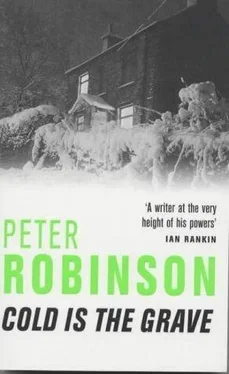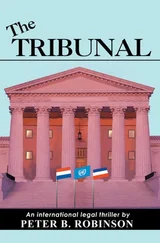Of course, despite Banks’s little crack the previous day, Annie hadn’t tracked down Dalton at the Fox and Hounds, and she felt a little guilty about palming Hatchley off on him. But not that guilty. Hatchley’s eyes had certainly lit up at the prospect of a pint. Annie knew that if Dalton stayed around much longer, it was only a matter of time before they bumped into each other. He might even walk into the detectives’ office this very moment, and then there would be no avoiding him. She didn’t want to meet him, didn’t want to talk to him, but she wasn’t scared of him, and she was damned if she was going to go around the place trying to avoid him anymore.
Hatchley said hello and grumbled about his aching feet.
“Where’ve you been?” Annie asked, feeling conciliatory after asking the favor of him. “Not another alien abduction?”
“No such luck. Charlie bloody Courage. You know, some people just don’t seem to care how much inconvenience they cause by getting themselves murdered.”
Annie smiled. “Daleview again?”
“Aye. And about as much use as the time you were there.”
“Nobody saw the van?”
“On a Sunday night about ten o’clock? Nobody there.”
“Except Charlie.”
“Except the PKF people, who we’re trying to find, Charlie himself, and Jonathan Fearn, the van driver, who’s still languishing in a coma in Newcastle.”
“Best way to be, in Newcastle,” said Annie.
“Nay, lass, it’s not such a bad place. Some grand pubs there. Anyway, according to my sources, Charlie did know Jonathan Fearn, so we’ve got a connection there, however tenuous. Peas in a pod.”
“Maybe Courage lined up the job for him, thought he was doing him a favor?”
“Could be.”
“What did you find out from this DI… what’s his name?”
“Dalton. DI Wayne Dalton. Seems a nice-enough sort of bloke. You ask me, though, he’s down on a weekend break.”
“In December?”
“Why not? The weather’s not so bad. He’s a bit of a rambler, apparently. Talking about going walking up Reeth way on Sunday morning. Says if he gets a nine-o’clock start, he’ll just about be ready to enjoy a pint and roast beef dinner at The Bridge in Grinton by twelve. The Bridge does a lovely roast beef and Yorkshire pud. Nice pint, too. Not that you’d catch me walking, mind you.”
Looking at him, Annie could believe it. Hatchley was about six feet two, with fine fair hair starting to thin a bit on top, the “roast beef” complexion of someone with blood-pressure problems and about thirty or forty pounds excess baggage, to be generous.
Her thoughts drifted off at what he said. Maybe that was the answer. If Dalton was indeed planning a walk on Sunday, the odds were that there wouldn’t be many people around. The middle of nowhere might be the best place to confront him. The idea excited her. It would mean making herself scarce on Sunday morning, but she thought she could probably manage that if she had everything in order by then. After all, with Banks away, she was in charge, so nobody was going to question her if she was out of the station for a few hours.
Dare she do it? What would she say if she stepped out in front of him on a deserted footpath? What would he do? Would he get physical, perhaps even try to get rid of her permanently? Having seen him again, Annie didn’t think she need worry on that score.
But perhaps, when it came down to it, what worried her more than what he might do to her in a lonely place was what she might do to him .
The lights were blazing in Barry Clough’s Little Venice villa when Banks and Burgess arrived shortly after eight that Saturday evening. Someone had even rigged up some Christmas lights on the facade of the house and put up a big tree in the garden.
“Bit early for a party, isn’t it?” said Burgess, glancing at his watch.
“It’s never too early for this lot,” said Banks. “Their whole life is one long party.”
“Now, now, Banks. Isn’t envy one of the seven deadly sins? Thou must not covet thy neighbor’s arse, and all that.”
The iron gates were open, but a minder stood at the front door asking for invitations. He wasn’t one of the two Banks had seen on his previous visit. Maybe Clough went through minders the way some people went through chauffeurs or maids. Hard to get good help these days. Banks and Burgess showed him their warrant cards, but he clearly wasn’t programmed to deal with anything like that. The way he screwed up his face in concentration as he looked at them, Banks wondered if he even got past the photographs.
“These mean we get in free,” said Burgess.
“I’ll have to check with the boss. Wait here.”
The minder opened the door to go inside, and before he could close it, Burgess had followed him, with Banks not far behind. Banks realized he had to remember whom he was with, what a loose cannon Burgess could be, and how he’d have to be on his toes. Still, he had invited the bastard, and it was good to have company you could depend on if the shit hit the fan. Burgess wasn’t one to shirk trouble, no matter what form it came in.
There were people all over the place. All sorts of people. Young, old, tough-looking, artsy-fartsy, well-dressed, scruffy, black, white – you name it. Music blasted through speakers that seemed to be positioned, discreetly out of sight, just about everywhere. Cream’s “Tales of Brave Ulysses,” Banks noticed. How retro. Still, Clough would have been in his mid-twenties when he was a roadie for the punk band, which meant he had been in his teens when Cream came along, pretty much the same age as Banks. The air reeked of marijuana smoke.
The minder, who had noticed his mistake, elbowed his way roughly through the crowds in the hallway, upsetting one or two less-than-sober guests, whose drinks he spilled, and returned before the song finished with Barry Clough in tow.
The man himself.
“Did we come at a bad time, Barry?” Burgess asked.
After the initial cold anger had fleeted across his chiseled features, Clough smiled with all the warmth of a piranha, clapped his hands and rubbed them together. “Not at all. Not at all.” The black T-shirt he was wearing stretched tight over his biceps, and other muscles bulged at the chest and shoulders. All he needed for the complete rebel look was a cigarette packet shoved up the sleeve. He wore no jewelry this time, and he was wearing his graying hair loose, tucked behind his ears on each side and hanging down to his shoulders. Banks was glad of that; he didn’t think he could handle matching ponytails. The loose hair made Clough look younger and softened his appearance a little, but there was still no mistaking the icy menace in his eyes and the feral threat in his sharply angled features.
“Tales of Brave Ulysses” segued into “swlabr.” Someone bumped into Banks from behind and muttered an apology. He turned and saw it was an attractive young girl, not much older than Emily had been. He vaguely recognized her from somewhere, but before he could remember where, she had disappeared into the crowd.
“Is there somewhere quiet we can talk?” Banks asked Clough.
Clough appeared to consider the question for a moment, head cocked to one side, as if it were his decision, a not-so-subtle way of gaining a psychological edge in an interview. It was wasted on Banks. He jerked his head toward the stairs. “Up there, for example,” he said.
Finally, Clough gave a minuscule nod and led them up the stairs. The first room they went into turned out to be occupied by a couple squirming and moaning on a pile of the guests’ coats.
“It’s unhygienic, that,” said Burgess. “I go to a party, you know, I don’t expect to go home with my raincoat covered in other people’s love juices.”
Читать дальше












